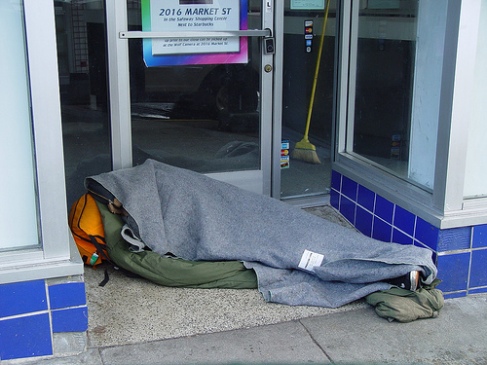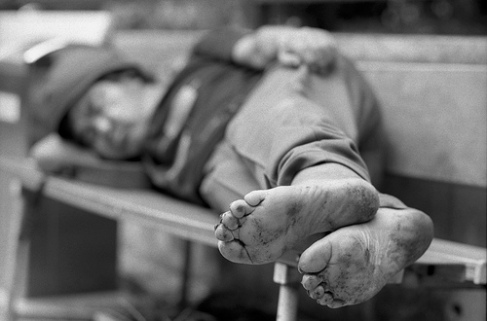Spain’s walking dead
From time to time I find myself thinking about the television show The Walking Dead and why I haven’t managed to stop watching it yet.
For those of you who have been lucky enough to miss the series, The Walking Dead is a post-apocalyptic zombie horror show set in the American south. Based on comic books, it centres on a group of people who have miraculously avoided catching a disease which has turned most humans on the planet into zombies, or ‘walkers’ as they are called in the series.
It’s an irresistible premise: for me at least. As a child of the eighties, I grew up in the shadow of The Bomb (remember that?) and I was reared on a steady diet of post-nuclear holocaust disaster literature. The most brilliant of these stories was — and remains — Russell Hoban’s Riddley Walker, a novel about humanity 2,000 years post-Armageddon.
Before I was ready for Hoban, though, there was the early 50s novel The Day of the Triffids by John Wyndham about the colonisation of earth by deadly plants. In Wyndham’s world, nearly everyone has been blinded by a spectacular but retina-burning meteorite shower. In the first scene of the novel, our hero wakes up in a hospital the morning after the celestial show which he was unable to watch because his eyes were bandaged. When he tries to summon a nurse or a doctor, no one comes. He soon discovers he has, in fact, been saved from blindness on two counts.
The Walking Dead borrows a lot from The Day of the Triffids; the first-ever episode even rephrased the opening scene of the Wyndham novel with the main character sheriff Rick Grimes waking alone in a hospital. This is not the only parallel between the two shows. Both, for example, have their own-eyed man who “is king in the land of the blind”. In John Wyndham’s novel, this situation is metaphorical. In The Walking Dead — an almost intolerably literal show — we have the character of the governor whose eye was removed in an act of revenge.
The television show and the 50s novel share one other key element. They are both almost quite dreadful, and I don’t mean in the horror sense.
Looking back at The Day of The Triffids now, I see that the writing is appalling clunky. In The Waking Dead, there are moments of technical brilliance—the zombies themselves are spectacular — but the show is generally awful. The acting is tolerable at best. The action is glacial in its progression, and the sets seem amazingly rickety for such a high profile show. So why do I keep watching?
Part of the answer is habit of course. And some of the fascination has to do with me wanting to see when the zombies are next going to turn some innocent victim into a gruesome mass of exposed tendons. But I also think there is some deeper subtext. I think The Walking Dead is popular because it serves as a useful metaphor for the current economic crisis.
The television show deals with a group of people who have lived through a Lehman Brothers-style cataclysmic event and must somehow find new meaning in life while also processing the guilt they feel at having survived the worst of it all. Meanwhile, the vast mass of humanity refuses to conveniently disappear. The streets of the brave new world in The Walking Dead are populated by zombies or ‘walkers’. In the show, these ‘people’ lurch around in the search for their next fleshy meal emitting agonising groans from time to time. In Spain, you can see them sleeping in doorways, begging at the portals of supermarkets, or selling tissues to cars stopped at traffic lights. Some have found solace in drink and drugs. Others stay at home and out of sight.
Meanwhile, the one percent — those, like me, with work and food and a home —try not to have too much contact with the zombies so as to avoid contagion. We keep our heads down on the streets and in the office. We keep the target small and forget to say thank you for our good luck as often as we should.
The really pending question in The Walking Dead, and the one that has been hinted at in series three, is that of a possible cure. Are the zombies an unchangeable feature of the landscape in the future, or will some magic formula restore our loved ones to us? If this is the case, then it’s not going to be a simple process. Expect more bailouts to follow.
And Happy Easter everyone, especially to the good people of Cyprus.


There will be a cure, but the longer it is put off, the more comfortable and less compassionate we lucky ones become, the more painful it will be, I’m afraid. It’s too easy to demand that others swallow the austerity pill if you don’t have to yourself.
Mikels Skele
March 31, 2013 at 21:19
I think things here in Spain will get much worse before they get better! it doesnt look like it will imporve any time soon, especially since sectors like health and education are being cut – it’s a downward spiral.
mappingthepeace
April 3, 2013 at 00:04